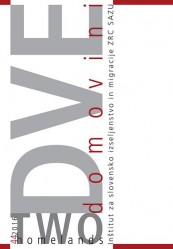The liberal linguistic turn: kymlicka’s freedom account revisited
DOI:
https://doi.org/10.3986/dd.2016.2.05Keywords:
Kymlicka, romanticism, Herder, assimilation, group-differentiated rights, multiculturalismAbstract
This article revisits the principal argument Will Kymlicka has developed for a marriage between liberalism and multiculturalism: that the liberal value of freedom requires a cultural context of choice. I show that this freedom argument rests on a romantic philosophy of language. Critics of this freedom argument have pointed out that it is not necessarily an individual’s own culture that provides freedom: any culture could do so. I articulate a romantic-Kymlickean response to this critique by showing how individuals’ life choices come to be entwined with the particular culture that provides their context of choice. But while that safeguards existing individuals from assimilation, it does not block future generations from being introduced into the life-world of an additional cultural context. Such slow intergenerational assimilation projects are not necessarily worrisome, however. They can sometimes have the virtue of realizing non-identity values in addition to freedom.
Downloads
References
Barnard, B. (1965). Herder’s Social and Political thought. From Enlightenment to Nationalism. Oxford: Clarendon Press.
Barry, B. (2001). Culture and Equality. An Egalitarian Critique of Multiculturalism. Cambridge: Polity Press.
Cipriani, G. (2014). Financing the EU Budget. Moving Forward or Backwards? London: Rowman & Littlefield.
De Schutter, H. (2011). Federalism as Fairness. Journal of Political Philosophy 19/2, 167–189.
Ferguson, C. A. (1959). Diglossia. Word 15, 325–340.
Forst R. (1997). Foundations of a Theory of Multicultural Justice. Constellations 4/1, 63–71.
Gans, C. (2003). The Limits of Nationalism. Cambridge: Cambridge University Press.
Galeotti, A. E. (2002). Toleration as Recognition. Cambridge: Cambridge University Press.
Grégoire, H. (2002 [1794]). Rapport sur la nécessité et les moyens d’anéantir les patois et d’universaliser l’usage de la langue française; Une politique de la langue. La Révolution française et les patois: l’enquête de Grégoire. (eds. M. de Certeau, D. Julia, J. Revel). Paris: Gallimard, 331–351.
Herder, J. G. (1877–1913). Sämtliche Werke 33 (ed. B. Suphan). Berlin: Weidmann Verlag. —(1987). Abhandlung über den Sprache II. Werke (ed. W. Pross). Munchen/Wien: Carl Hanser Verlag.
Kymlicka, W. (1989). Liberalism, Community and Culture. Oxford: Oxford University Press. —(1995). Multicultural Citizenship. A Liberal Theory of Minority Rights. Oxford: Oxford University Press. —(2001). Politics in the Vernacular. Nationalism, Multiculturalism and Citizenship. Oxford: Oxford University Press.
Lafont, C. (1994). Sprache und Welterschliessung. Zur linguistischen Wende der Hermeneutik Heideggers. Frankfurt am Main: Suhrkamp.
Larmore, C. (1996). The Romantic Legacy. New York: Columbia University Press.
van Leeuwen, B. (2006). Social attachments as conditions for the condition of the good life? A critique of Will Kymlicka’s moral monism. Philosophy and Social Criticism 32/3, 401–428.
Patten, A. (2001). Political Theory and Language Policy. Political Theory 29/5, 683–707.
Patten, A. (2010). The Most Natural State: Herder and Nationalism, History of Political Thought XXXI/4, 657–689.
Pogge, T. (2003). Accommodation Rights for Hispanics in the U.S. (eds. W. Kymlicka, A. Patten). Language Rights and Political Theory. Oxford: Oxford University Press, 105–122.
Swyngedouw, M., Abts, K., Baute, S. Galle, J., Meuleman, B. (2015). Het communautaire in de verkiezingen van 25 mei 2014. CeSO/ISPO/2015–1.
Tamir, Y. (1993). Liberal Nationalism. Princeton: Princeton University Press.
Taylor, C. (1993). Reconciling the Solitudes. Essays on Canadian Federalism and Nationalism (ed. Guy Laforest). Montréal/Kingston: McGill-Queen’s University Press.
Waldron, J. (1992). Minority Cultures and the Cosmopolitan Alternative. University of Michigan Journal of Law Reform 25/3, 4, 751–793.
Weinstock, D. (2003). The Antinomy of Language Rights (eds. W. Kymlicka, A. Patten). Language Rights and Political Theory. Oxford: Oxford University Press, 250–270.
Downloads
Published
How to Cite
Issue
Section
License

This work is licensed under a Creative Commons Attribution-NonCommercial-NoDerivatives 4.0 International License.
Authors guarantee that the work is their own original creation and does not infringe any statutory or common-law copyright or any proprietary right of any third party. In case of claims by third parties, authors commit their self to defend the interests of the publisher, and shall cover any potential costs.
More in: Submission chapter





